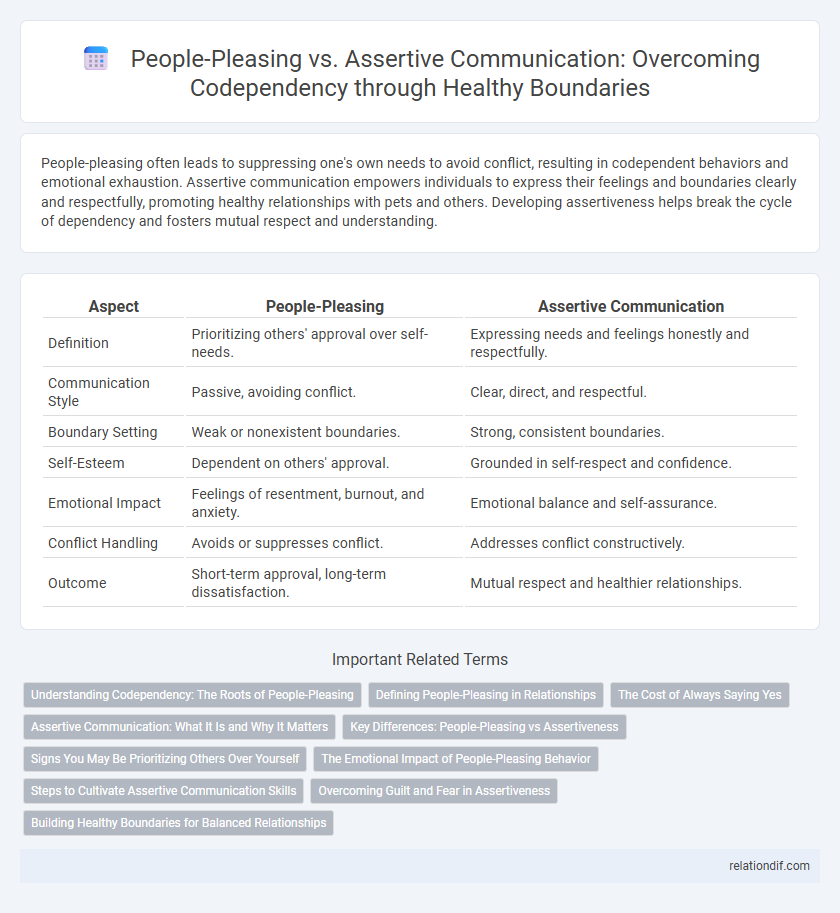People-pleasing often leads to suppressing one's own needs to avoid conflict, resulting in codependent behaviors and emotional exhaustion. Assertive communication empowers individuals to express their feelings and boundaries clearly and respectfully, promoting healthy relationships with pets and others. Developing assertiveness helps break the cycle of dependency and fosters mutual respect and understanding.
Table of Comparison
| Aspect | People-Pleasing | Assertive Communication |
|---|---|---|
| Definition | Prioritizing others' approval over self-needs. | Expressing needs and feelings honestly and respectfully. |
| Communication Style | Passive, avoiding conflict. | Clear, direct, and respectful. |
| Boundary Setting | Weak or nonexistent boundaries. | Strong, consistent boundaries. |
| Self-Esteem | Dependent on others' approval. | Grounded in self-respect and confidence. |
| Emotional Impact | Feelings of resentment, burnout, and anxiety. | Emotional balance and self-assurance. |
| Conflict Handling | Avoids or suppresses conflict. | Addresses conflict constructively. |
| Outcome | Short-term approval, long-term dissatisfaction. | Mutual respect and healthier relationships. |
Understanding Codependency: The Roots of People-Pleasing
People-pleasing often stems from codependency, where individuals prioritize others' needs to gain approval and avoid conflict, sacrificing their own boundaries. In contrast, assertive communication involves expressing thoughts and feelings honestly while respecting both personal and others' rights. Recognizing these patterns helps break the cycle of codependency by fostering self-awareness and healthier interpersonal dynamics.
Defining People-Pleasing in Relationships
People-pleasing in relationships involves prioritizing others' needs and approval over one's own well-being, often leading to suppressing personal boundaries and desires. This behavior stems from a fear of rejection or conflict, resulting in an imbalanced dynamic where one consistently sacrifices authenticity to maintain harmony. Understanding people-pleasing is crucial for developing assertive communication, which promotes expressing thoughts and feelings honestly while respecting both parties' needs.
The Cost of Always Saying Yes
Constantly saying yes to please others results in emotional exhaustion, resentment, and a blurred sense of self, often seen in codependent individuals. This behavior undermines assertive communication, which promotes healthy boundaries and self-respect while maintaining genuine relationships. Developing assertiveness enhances emotional well-being and reduces the risk of burnout associated with chronic people-pleasing.
Assertive Communication: What It Is and Why It Matters
Assertive communication involves expressing thoughts, feelings, and needs openly and respectfully, fostering healthy relationships while maintaining personal boundaries. This communication style reduces misunderstandings and resentment often seen in people-pleasing behaviors, which prioritize others' approval over self-care. Mastering assertive communication empowers individuals to build self-esteem and achieve balanced interactions essential in overcoming codependency.
Key Differences: People-Pleasing vs Assertiveness
People-pleasing involves prioritizing others' needs at the expense of one's own boundaries, leading to passive communication and often resentment. Assertive communication emphasizes clear, honest expression of thoughts and feelings while respecting both personal rights and those of others. Key differences include motivation--people-pleasers seek approval and avoid conflict, whereas assertive individuals value mutual respect and healthy boundaries.
Signs You May Be Prioritizing Others Over Yourself
Constantly avoiding conflict and saying "yes" to requests despite personal discomfort often indicates people-pleasing tendencies linked to codependency. Difficulty expressing true feelings or needs and a persistent fear of disappointing others frequently overshadow legitimate self-interest. Prioritizing others' approval over personal boundaries results in emotional exhaustion and diminished self-worth, signaling an urgent need for assertive communication skill development.
The Emotional Impact of People-Pleasing Behavior
People-pleasing behavior often leads to suppressed emotions and increased anxiety, as individuals prioritize others' needs over their own well-being. This emotional toll can cause feelings of resentment, low self-esteem, and chronic stress due to the inability to express genuine thoughts and desires. In contrast, assertive communication fosters emotional balance by encouraging honest self-expression and healthy boundary-setting, which reduces internal conflict and promotes psychological resilience.
Steps to Cultivate Assertive Communication Skills
Developing assertive communication skills involves recognizing personal needs and expressing them clearly while respecting others' boundaries. Practicing using "I" statements, setting firm but polite boundaries, and maintaining calm body language are essential steps. Regular self-reflection and seeking feedback help reinforce confidence and reduce tendencies toward people-pleasing behaviors.
Overcoming Guilt and Fear in Assertiveness
People-pleasing often stems from deep-seated guilt and fear of rejection, which hinder assertive communication and perpetuate codependent patterns. Overcoming these barriers involves recognizing the validity of personal needs and practicing clear, respectful expression without fear of negative judgment. Developing assertiveness builds self-confidence and breaks the cycle of guilt-driven compliance, fostering healthier relationships and emotional autonomy.
Building Healthy Boundaries for Balanced Relationships
People-pleasing often results in compromised boundaries, leading to unhealthy relationships marked by resentment and burnout. Assertive communication empowers individuals to express their needs and limits clearly, fostering mutual respect and emotional balance. Building healthy boundaries through assertiveness strengthens self-esteem and promotes balanced, fulfilling connections.
People-pleasing vs Assertive communication Infographic

 relationdif.com
relationdif.com